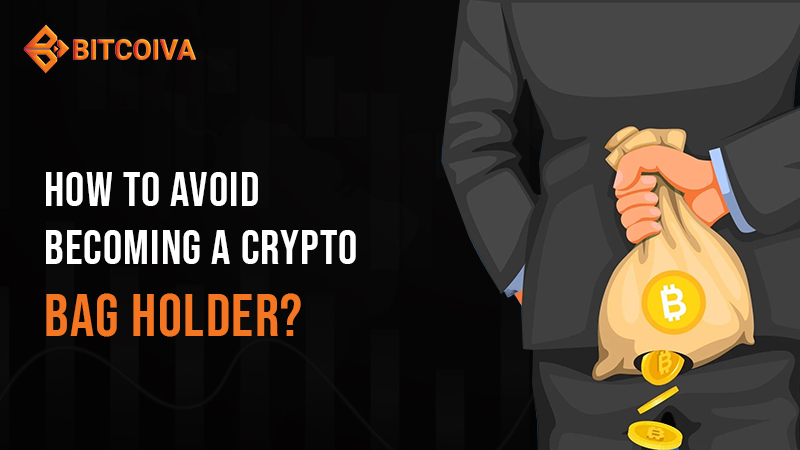Investing in digital currencies can be Interesting and potentially lucrative, but it has its pitfalls. One of the most dreaded terms in the crypto world is becoming a “bag holder.” If you’re new to crypto or investing in general, understanding this term is crucial to navigating the volatile waters of digital assets. In this blog, we’ll explore what it means to be a bag holder, how to avoid becoming one, and what to do if you find yourself in this situation. Bitcoiva, the best cryptocurrency exchange in India to buy, sell Bitcoin BTC, Ripple XRP, Ethereum ETH,Tron TRX, Bitcoin Cash BCH, Litecoin LTC, etc.
What is a Bag Holder?
In crypto investments, a “bag holder” is an investor who continues to hold onto an asset, usually a cryptocurrency, that has significantly lost value. The term comes from the idea that you’re left “holding the bag” when everyone else has already sold and moved on. Bag holders are often stuck with assets that can be hard to trade at an affordable cost because there is little demand for them in the market. This can happen for several reasons:
- A Rapid Market Decline: A sudden drop in price due to market trends or external factors.
- Poor Project Fundamentals: The underlying project may have failed to deliver on its promises, causing its value to plummet.
- Pump-and-Dump Schemes: Manipulative practices where a group artificially inflates the price of an asset, then sells it off quickly, leaving later buyers holding the bag.
How Do Investors Become Bag Holders?
Becoming a bag holder is often a result of a mix of emotional and psychological factors, along with a need for more information or preparation. Here are some common reasons why investors end up in this position:
- FOMO (Fear of Missing Out): Investors often buy into a cryptocurrency because they see others profiting from it. They fear missing out on potential gains, leading them to buy in at the top of a price surge.
- Lack of Research: Not thoroughly researching the project behind the cryptocurrency can lead to poor investment choices. If the project lacks a strong use case, utility, or competent team, its value may collapse.
- Holding Out for a Recovery: Some investors are overly optimistic that a crypto asset will recover to its previous highs. This emotional attachment can lead to holding onto an asset longer than is financially wise.
- Overexposure to One Asset: Failing to diversify their portfolio can make investors more vulnerable to market downturns. If most of an investor’s portfolio is in one asset, they can quickly become a bag holder if that asset crashes.
How to Avoid Becoming a Bag Holder
- Conduct Thorough Research: Conduct detailed research on any cryptocurrency you invest in. Look into the project’s whitepaper, team, technology, partnerships, and community support.
- Set Proper Entry and Exit Positions: Declare your entry and exit points before investing. Have a plan for when to take profits and when to cut losses. Stick to these points to avoid emotional decision-making.
- Diversify Your Crypto Portfolio: Split your investments across various cryptocurrencies or asset classes to mitigate the risk. Diversification protects the impact of any single asset losing value drastically.
- Stay Informed and Adaptable: Stay updated on market news, trends, and regulatory changes that might affect your investments.
- Practice Good Risk Management: Only investing what you can afford to lose, setting stop-loss orders, and using risk management tools often protect your capital.
What to Do If You’re Already a Bag Holder
If you find yourself in the position of a bag holder, don’t panic. Here are some steps you can take:
- Evaluate the Fundamentals: Re-assess the fundamentals of the asset you’re holding. Has anything changed that could lead to a recovery? If the fundamentals are still strong, it might be worth holding on.
- Cut Your Losses: Sometimes, selling at a loss is better than reinvesting in a more promising asset. Assess whether holding onto the asset is worth the potential opportunity cost.
- Consider Dollar-Cost Averaging: If you believe in the long-term potential of the asset, consider dollar-cost averaging to lower your overall cost basis. However, this strategy should be cautiously approached and only applied to assets with solid fundamentals.
- Seek Community and Expert Advice: Engage with the community or seek expert advice to understand the sentiment around the asset. Getting valuable insights from other experts can protect your portfolio.
Conclusion
Becoming a bag holder in crypto investments is a situation every investor wants to avoid, but it happens more often than you might think. You can manage your assets by reducing the chances of ending up in this undesirable position by conducting thorough research, managing risk, diversifying, and staying informed. And if you find yourself holding the bag, remember that there are steps to minimize your losses and potentially recover from the situation.
Invest wisely, stay informed, and always be prepared to adapt your strategy. Navigating the crypto market with the right approach will help you succeed in this unpredictable market.
visit: www.bitcoiva.com

